- Home
- J. -H. Rosny aîné
Helgvor of the Blue River Page 8
Helgvor of the Blue River Read online
Page 8
Akroun, watching his rival’s friends with anxiety, remembered with bitterness the days, not so far in the past, when the tribe had followed him blindly. Then, Heigoun had waited for the time to ripen. Now, the chief sensed distrust in the depths of his men’s souls, knew that he was reproached with the loss of the women. He rose, and the fires cast red reflections in the amber eyes. His mighty face simulated confidence. And he spoke.
“The chief has gathered the warriors to consult their wisdom. The road alongside the river is flooded. But it is the shortest route. Must we follow it, or strike across land? Let the warriors think it over!”
Heigoun lurched to his feet, bulky, formidable. His shoulders oscillated slowly, his powerful jaws were contracted, and when he opened his mouth he showed white fangs.
“The experience of the chief is great and the warriors shall obey his orders. But if the river road is the shorter, it will take longer to follow. The Tzohs will not have followed it. The Tzohs have gone inland.”
His enormous hand indicated the west, while his companions exclaimed approvingly. “Hunting is difficult near the shore! Tonight, the Gwahs will not get enough flesh, and the Gwahs are with the Ougmars only to eat. Do the Ougmars wish the Gwahs to go away? Then they shall not be numerous enough to attack the Tzohs!”
His backers agreed by words and gestures. The undecided looked on timidly, ready to fall in with the new power. When Akroun rose to answer, his chest was seen to quiver.
“Heigoun is a clever warrior! But what does he know of the enemy? What do the Ougmars know? The tracks have not been picked up. We must seek their trail. Here is what Akroun wishes. Seven warriors, with Gwahs and dogs, will scout along the river. All will bring back the flesh of animals they hunt. Thus will the Ougmars know the right way. The chief has spoken. The warriors shall obey.”
Then the timid men who had waited for a decision again trusted the chief, while Heigoun’s supporters were silent and still. Understanding that the occasion had not arrived, the son of the Wolf said,
“Heigoun can command scouts to march overland?”
The chief agreed. But a suspicion stirred the giant; he looked at Helgvor, he looked toward Glava. Akroun understood, and, being careful not to nurture a quarrel before the Tzohs had been beaten, he intervened.
“Shtra shall command the men who will follow the river, and Helgvor will be the guide.”
Helgvor looked at Glava with despair. A deep rancor rose in his heart.
XI. The Enemy
At dawn, Heigoun started out inland with six warriors, a few Gwahs and dogs. Shtra, with Helgvor, left for the river, his troop bearing two canoes to ford the pond. When the sheets of water were narrow they circled them or at times waded across.
Gloomy thoughts depressed Helgvor. The image of Glava tormented his youth, and because he was incapable of analyzing his mind, that image dominated his acts and his impulses. Formerly, the defeat of the Tzohs would have absorbed his whole being. Now, he thought much more of winning Glava.
Shtra loved Helgvor. He was a warrior with peaceful ways, humble before the chief, and he detested Heigoun. With much experience and little intuition, without ambition to command, he loved his ease. On the trail, at war and during the hunt, he performed his duties without ardor. He killed animals calmly, he was ready to exterminate the Tzohs. In like fashion, he would have liked to deprive Heigoun and his friends of their lives, preferably by some trick, had Akroun so ordered. Death did not perturb him, neither did the sufferings of those toward whom he was indifferent, but he would have mourned for Iouk or Helgvor many days.
Iouk, brother of Helgvor, resembled Shtra. More alert, he hated strongly. Although born before Helgvor, he acknowledged without anger or envy the superior strength and skill of his brother; he even was proud of him. For he was of those men for whom others may seem happy parts of their own beings.
For the first hours the little expedition progressed slowly. The six dogs, the wolf, the Gwahs and the warriors searched in vain for tracks. When the Sun had crossed the first quarter of the sky, Shtra said,
“If the Tzohs passed here before the flood, they must be very far ahead.”
“Is not the flood wider upstream?” Helgvor asked.
Shtra shrugged. His narrow face resumed its apathetic gentleness. They had crossed a submerged ravine, had circled rocks, and walked on dry soil. The Gwahs searched casually, for they were hungry and wished to rest. A halt was ordered.
Then Helgvor explored the plain, and to see better, climbed on a boulder. Furtive animals appeared in a flash and vanished. He saw a deer, horses, a triangular flight of cranes under a cloud. The dogs and the Ougmars also searched. At last the eyes of Helgvor lit up. A herd of aurochs had appeared in a ravine.
He slipped through the thickets, crawled in the tall grass, and came within arrow range of the herd. The aurochs had stopped in the ravine, where fresh grass grew.
Two enormous bulls protected the herd, and perhaps after an unsatisfactory combat, kept far from one another. Tawny hair grew on their shoulders and straggled over their eyes. Their limbs were slender for their tremendous bodies which tapered from their broad, shaggy chests to slim hindquarters. They gave an impression of immense strength united with extreme agility. Their horns, spread wide and sharp, were strong enough to toss aside lion, tiger or gray bear.
The herd grazed quietly. At intervals, one of the bulls would lift his monstrous head and seem to catch on his sensitive nostrils the emanations in the atmosphere, to catch within the radiance of his big, dark eyes the reflection of his surroundings.
Helgvor crept nearer, bent his bow.
One of the bulls bellowed; the cows lifted their melancholy heads as the dread effluvia of man drifted through the air. Several knew the smell, and one of the bulls who had already seen the erect beast on his horizon gave the signal for retreat.
An arrow struck him in the chest, a keen point stabbed for his heart. Furious, he charged for the center of the smell while the herd fled.
Helgvor stood up. Filled with admiration for the colossal beast, aware that he was protecting the herd, he felt a dim regret. But the Ougmars, the Gwahs, the animals, waited for the flesh that creates flesh. A second arrow dug into the chest, then Helgvor drew a spear from his belt. The wounded aurochs had lost all sense of preservation, thought only of crushing his attacker, longed to gore him with his horns. He came on like a boulder rolled in an avalanche.
Helgvor threw his spear. It penetrated near the shoulder. Rage and pain caused the aurochs to roar like a lion. When the gigantic beast was but a stride away, Helgvor leaped nimbly aside, and his club swung down. It struck on the skull, bounced off, fell back and broke the bull’s foreleg. From then on the man was the master. Clumsy, almost helpless, the beast tried several attacks, which the hunter easily avoided.
“The warriors and the dogs need the flesh of the great aurochs!” he said.
He expressed in this way, without being aware of it, his admiration for the immense beast, and his sorrow to slay it. For the bull was dying. His large eyes were foggy. He no longer attacked, but waited motionless, in the dream of death, on the mysterious brink of Nothingness. Then he trembled, a raucous plaint rose from his deep throat, and suddenly he tumbled into the grass, dead.
Helgvor called the Gwahs and the Ougmars. All were coming near, their eyes avidly fastened on the enormous prey. The Gwahs grinned their silent, primitive grimace of a laugh, almost like that of the dogs.
“There!” Helgvor announced, “there is much flesh now.”
“Helgvor is a great hunter!” Shtra said, while Iouk made a fire.
But Helgvor paid no heed to his praise. He had seen, not far away, a wide, dark spot in the grass, and joy dilated his breast. The Tzohs had camped there. The ashes still seemed fresh. Bones were strewn about, with rags of fur. Helgvor called his wolf and his dog, made them smell the encampment.
Behind, the Gwahs were watching Iouk striking flint. Their eyes gleaned like those of jackals. Shtra was laughing
softly. “The Gwahs have forgotten famine. They will follow the warriors like dogs.”
Helgvor announced, “The tracks of the Tzohs are found. They camped in this ravine last night.”
The Ougmars were skinning the aurochs, and already large quarterings of meat emanated the heady aroma of cooking food.
If Helgvor thought of the Tzohs, who had to be exterminated, he thought even more of Glava; he could imagine her, somber and angry, near the fires; her breast would dilate as if to lift space, while her heart was heavy as a block of granite. And he intensely hated Heigoun with the hairy chest.
The dog and the wolf followed the tracks.
To avoid confusion, other animals were held behind. Because of the numbers of the Tzohs and their captives, their trail was easily followed for a long time. Across pools, plains and hills the scouts progressed for two-thirds of one day. A tributary river was reached, which rolled muddy waters rapidly, and on the far side of that stream the tracks had vanished.
As the Tzohs could not have gone upstream—the river was swift as a torrent—the scouts must seek downstream. In any case it was easier in that direction, for the ground was high and dry. The tracks of the Tzohs were found.
Then a bloodstained spear left behind announced that the Tzohs had passed here recently. Shtra, Iouk and Helgvor examined the weapon carefully.
“The Tzohs are near,” Shtra concluded. “The blood is not yet black.” He shook his head anxiously. “Did not Helgvor see 100 warriors before meeting the fugitives?”
“They were more than 100 when they attacked the Red Peninsula, and more than 100 also when Helgvor counted them on the plain.”
“Then Shtra shall take care not to start a fight with them, having only a few warriors and the Gwahs.”
“That fire of which Shtra saw the ashes was not a fire for 100 warriors!”
“Perhaps they didn’t have enough dry wood!”
“Helgvor thinks the pursuit must be kept up.”
“So does Iouk!”
“Let’s follow the tracks,” Shtra said with resignation. They walked for two hours, then the trail was evidently so recent that all were aware the Tzohs were very near. All doubts were removed when the distinct imprints of feet were discerned on moist soil. Some were so clear that Shtra commented, “Here passed the heavy feet of the Tzohs, and here the light feet of the women.” A sudden rage swept this pacific man and his fists knotted.
Helgvor, trying to read the tracks, followed them for some hundreds of yards, then retraced his steps. “The Tzohs are not more numerous than the fingers of three hands!”
“The Gwahs and the Ougmars united are less numerous than the Tzohs! The Gwahs are weak and poorly armed.”
“Helgvor’s wolf will fight, and the dogs will harass the foes.”
Shtra was silent, uncertain as to what should be done.
“Our arrows carry further than those of the Tzohs,” the young man argued. “Their warriors aim badly. The men on our side who cannot shoot well can turn over their arrows to Helgvor.”
“Yes, Helgvor has the eye of the hawk,” Shtra agreed.
“Helgvor shall go first. He shall kill some Tzohs and lure the others into pursuit. Shtra and the warriors will lie in ambush.”
While Shtra still hesitated, Iouk intervened. “Our women are with them!” he growled, and his eyes flashed.
“Let Helgvor guide us, then,” Shtra said, filled with fury, speaking in a vehement voice. “When we get near the Tzohs, we shall ambush thern.”
The little troop started again, preceded by Helgvor and Iouk. The tracks vanished, reappeared. A long hill, low and green, barred the horizon. They climbed the slopes slowly. On the crest they came upon a circular clearing studded with boulders and thick with bushes.
“Let Shtra await his son here,” Helgvor said. “The Tzohs are down below.”
He progressed alone, cautiously. A narrow granite plateau crowned the hill’s crest. Coarse grass grew there, broken by small trees, bushes and low, stone masses. Since a moment ago, the dog showed an agitation which the wolf soon shared. They crept between the boulders with care.
A low whistle checked them. Helgvor had reached the rim of the plateau. Crouched on the ground, he crept, and his quicker breath revealed his emotion.
At the bottom of the hill, stopped by the flood, the Tzohs were lighting their fires. The captive women, squatted, huddled, were obviously exhausted. Perhaps 30 warriors were there on the nude soil, and although the majority seemed as worn out as the females, almost all were young men fitted for combat. Before those thick torsos, those mighty shoulders, the Gwahs would be as children. Only the strongest Ougmars might cope with them.
Nevertheless, Helgvor saw that the encampment, protected from direct attack, could be flanked and riddled with arrows. He cast a glance at the big bow suspended from his shoulder. He had five arrows, all tipped with nephrite stone points, and he knew that he could shoot them from a distance beyond the range of the Tzohs’ puny bows.
His chest swelling with the fighting excitement of war, he went back to the crest of the hill. He addressed Shtra, “If Helgvor has many arrows, he will drop a good many Tzohs. The others can be wiped out by the warriors and the Gwahs.”
He described the position occupied by the enemy.
“Shtra wants to look,” the chief said.
He requisitioned a dozen arrows for Helgvor. The two warriors climbed to the crest and Shtra, having counted the Tzohs, yielded gloomily to the prestige of his tall son.
“Shtra and his warriors will wait among the boulders.”
He went back to camp and Helgvor descended the far slope of the hill, very slowly, having ordered the dog and the wolf to wait for him, a command which they understood as well as men might have. Helgvor felt this would be a great day in his life; his heart was beating hard and a great lucidity reigned in his brain.
But the nearer he approached the more daring the adventure became. The faces and bodies of the Tzohs appeared to be more alive; he discerned clearly their broad, swarthy faces, the granite-like jaws, the jackals’ pupils. If they surrounded him his death was near, and he sensed this fully as he advanced upon them.
Although he thought himself quicker than they, doubts assailed him like treacherous beasts. Among so many young warriors perhaps a few would possess, as he did, the speed of the stag and the spring of the leopard. Even a slight wound in the leg would cause his death, by placing Helgvor at his enemies’ mercy. Skilled in the use of trees and grass to screen himself, he had arrived within two arrows’ flight. The soil was bare, covered with silvery moss, save on the boulders where the growth was reddish and green.
Another step, and Helgvor would be visible.
For a moment his heart pounded so fast that his strength seemed puny before these gathered forces; the love of life stirred in him like the leaves of the sycamore in the breeze. Thinking of Glava, he faltered. Her glowing eyes and tawny hair appeared all the joy in the world. It was brief; the day was come when victory would make him a warrior feared by all. If he drew back now, Glava would scorn him and he would not dare reappear among his people.
XII. Lone Attack
A Tzoh saw him, another, and in succession the cubical heads lifted. Their stupefaction was so intense that they were silent at first. They stared at this lone warrior and searched for his companions. There were none, and the man was coming on, in long strides, charging upon the camp alone.
Then some of the Tzohs identified him. He was the very man who had rescued the fugitive women. Kamr had gone after him with five men, and none had come back. Trusting in their numbers and accustomed to battle, they rose and uttered the challenging death-yelp.
“Helgvor killed two Tzohs, then four of those in the big canoe,” the nomad shouted. “Helgvor killed the chieftain with the wide shoulders. All the ravishers shall perish!”
The women, mute and filled with terror, with hope, listened to this ringing voice. Their youth, memories of the Red Peninsula, flooded them
with quivering joy.
Helgvor ran nearer. He was soon within range, and stretched his bow. The arrow scarcely grazed the shoulder of a warrior and the Tzohs howled with rage. Two other missiles reached their targets. One pierced the breast of a warrior, the other sank into his belly.
The Tzohs returned his fire, but their bows did not carry far, the few arrows which reached the nomad were spent, powerless. Three more times the great bow hummed, and two enemies received deep wounds.
Enraged, the Tzohs started for the lone man. He retreated, and while retreating wounded two other men. The others rushed madly, save for six, staying to watch the captive women. Helgvor had three arrows left. He saved them for the supreme struggle and took flight, which scattered the pursuers. Three, faster afoot than were the others, had gained a long lead by the time the Ougmar reached the crest. They were young men, at the age when legs are very speedy but arms weak. They were together, armed with bronze hatchets and spears.
Suddenly they saw Helgvor no more. Fearing ambush, they slackened speed. A rustling caused them to turn. The Ougmar had risen behind them, between two boulders, a spear poised; the sharp weapon hurtled through the air, and the nearest Tzoh fell. The others launched their spears. One of them wounded Helgvor in the head, but rushing forward he swung his club, smashed the skull of one of the young warriors, while the point of a spear darted from the left hand, piercing the throat of the other.
The attack had been so swift that none of the other pursuers was within arrow range when Helgvor resumed his flight and scrambled down the slope. He shouted in a voice which resounded in the camp of his comrades,
“Helgvor wounded nine Tzohs. Let the warriors be ready for combat.”
Within a few moments his strides seemed to falter. He lifted his hand to his head, from which blood flowed, and looked at that hand, reddened with blood. He gestured then, to make his injury obvious to the Men of the Rocks. Then, pretending to weaken, he stumbled. Sure that he was dropping, the most eager dared to leave the group of runners.

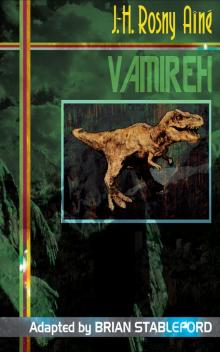 Vamireh
Vamireh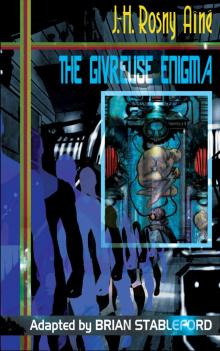 The Givreuse Enigma
The Givreuse Enigma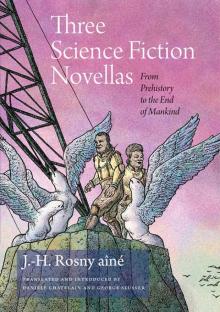 Three Science Fiction Novellas: From Prehistory to the End of Mankind
Three Science Fiction Novellas: From Prehistory to the End of Mankind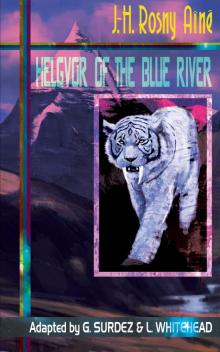 Helgvor of the Blue River
Helgvor of the Blue River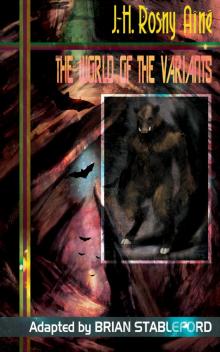 The World of the Variants
The World of the Variants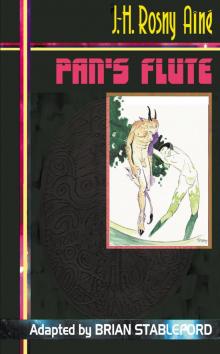 Pan's Flute
Pan's Flute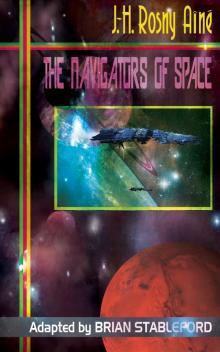 The Navigators of Space
The Navigators of Space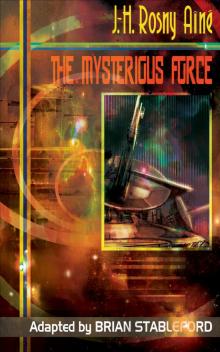 The Mysterious Force
The Mysterious Force